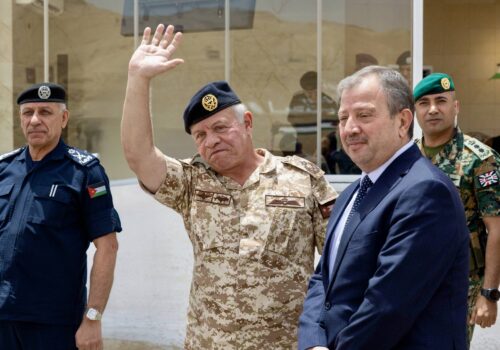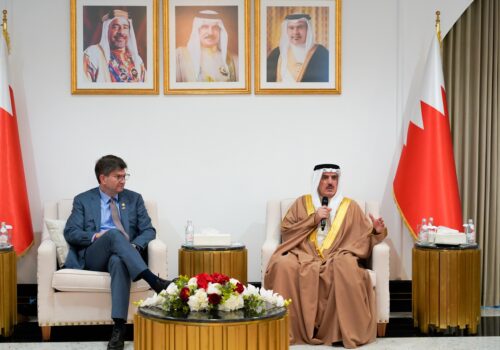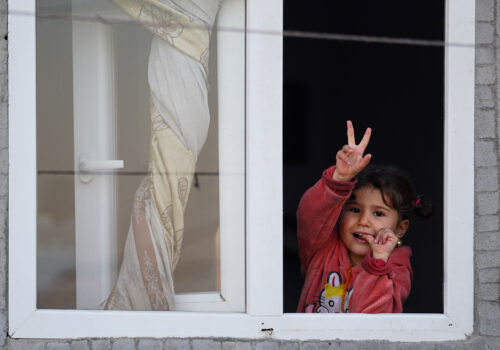Why King Abdullah’s rule in Jordan has endured despite turbulence
King Abdullah II has ruled Jordan for twenty-six years, longer than the combined maximum terms of three US presidents. While the leaders of Egypt, Tunisia, Yemen, and Libya were ousted during the 2011 Arab Spring protests, Abdullah survived the wave of discontent. To Jordan’s north, Syrian President Bashar al-Assad was toppled last December after an offensive launched by the rebel group Hayat Tahrir al-Sham. So, with a struggling economy, little oil, and surrounded by wars, how has Abdullah remained in power for more than a quarter century?
The role of security forces
Jordanian security forces’ support for Abdullah has played a key role in maintaining the king’s rule. Jeffrey Goldberg argued in The Atlantic that Jordan’s General Intelligence Department (GID) is the “most respected” Arab intelligence apparatus, winning accolades for its ability to thwart terror attacks.
Following his father and predecessor King Hussein’s directives, Abdullah has largely staffed the country’s military and intelligence apparatus with Jordanians of tribal descent, a leaked 2007 State Department cable revealed. Jordanians who originated from the Eastern side of the Jordan River are largely of tribal background and have long served as a pillar of Hashemite rule.
While Jordanians of Palestinian origin represent roughly half of the Hashemite Kingdom’s population, only a select few serve in key security roles. The 1970 Civil War, when thousands of Palestinians in Jordan’s army defected to the Palestine Liberation Organization (PLO), reinforced to the monarchy that it was best to rely on Jordanians of tribal descent.
During one of the greatest threats to Abdullah’s rule, the 2021 Prince Hamzah sedition affair, Jordan’s security forces overwhelmingly stood with the king. In a sensitive mission, Abdullah dispatched Major General Yousef Huneiti—Chairman of the Joint Chiefs of Staff—to inform Hamzah that his movements and communications were being restricted. When Hamzah later castigated Jordan’s ruling elite to separate himself from Abdullah, the overwhelming majority of the military and intelligence apparatus declined to side with the disgruntled prince, a necessary condition if Hamzah were to successfully carry out a coup. Three years later, Jordan’s security forces once again proved their loyalty by thwarting an Iranian-led plot to smuggle weapons to a Muslim Brotherhood cell in the kingdom with links to the Palestinian militant group Hamas. Unlike in neighboring Syria under Assad, the Jordanian military has prevented non-state militias from establishing autonomous zones in parts of the Hashemite Kingdom, ensuring that a full-fledged rebellion against Abdullah cannot be effectively launched.
SIGN UP FOR THIS WEEK IN THE MIDEAST NEWSLETTER
In addition to combating terrorism, Abdullah’s security forces’ crackdown on local political activists has also contributed to his decades-long reign. The Hashemite regime has worked tirelessly to ensure that the Muslim Brotherhood, Jordan’s largest opposition party, does not have a fair chance to win power. In 2015, authorities jailed a leader of Jordan’s Muslim Brotherhood for criticizing Amman’s longtime ally, the United Arab Emirates. Last month, the Jordanian government announced a ban on the Muslim Brotherhood and shuttered the group’s offices accusing the Islamist group of plotting attacks involving rockets and drones inside the Hashemite Kingdom. (During last year’s parliamentary election, the Islamic Action Front, the Muslim Brotherhood’s political arm, won the most seats of any party.) Abdullah’s 2013 labeling of the Islamist group as a “masonic cult” and “wolves in sheep’s clothing” made clear that his security forces were not acting in a rogue manner in their pressure campaign. Jordanian authorities’ harassment of political parties was not limited to Islamist factions. In 2018, former Foreign Minister Marwan Muasher, a Christian, formed a secular party called the Civil Alliance to provide a progressive perspective in parliament. However, Jordan’s intelligence summoned activists and pressured them to stop participating in the party, leading to its collapse. (Muasher contended that Jordanian government officials were uninterested in the growth of independent political parties that would share in national decision-making.) Since no independent political party can thrive, Abdullah has continued to dominate Jordan’s political scene without allowing the formation of any genuine domestic challenge.
The Arab Spring
As the region erupted in anti-government, pro-democratic protests in 2011, Abdallah maintained a delicate balancing act inside Jordan.
Abdullah enjoyed structural advantages during the Arab Spring as a regional monarch. While four Arab presidents were toppled during the Arab Spring demonstrations, protestors did not overthrow a single king across the Middle East during these turbulent years.
Abdullah fired four prime ministers in less than two years, showing that he was attentive to public discontent over corruption and high unemployment even as the bulk of Jordan’s power remained in his hands. With Jordan’s premiers tasked with managing the country’s day-to-day economic and administrative challenges, Abdullah as king is considered above such low-level challenges. Muasher and political analyst Marina Ottaway wrote that Arab monarchs “enjoy an extraordinary degree of legitimacy in the eyes of their citizens.” Most citizens in countries led by Arab kings, Muasher contended, sought government reforms, not regime change.
Unlike in a presidential system, Jordanians have long understood that a relative of the monarch would replace the current king, instead of an outsider. The Hashemite king also serves as a unifying figure, offering protection to minority groups such as the Circassians. Monarchies are part of the “country’s DNA,” notes Russell Lucas, with armies and regime institutions intimately tied to the king. Furthermore, Abdullah also benefits from religious backing for his kingdom since he claims to be a direct descendant of the Prophet Muhammad. Monarchies also seek to help each other during moments of distress, with Gulf states providing Jordan generous financial assistance during Abdullah’s reign. It is not in any Arab monarch’s interest for a fellow king to be booted from power due to street protests.
While the king has denied opposition activists the opportunity to advance genuine political change, Abdullah has maintained a delicate balancing act in his treatment of these protestors.
This exists in contrast to his Baathist neighbor to the north in Syria, where Assad used brute force to try and quell opposition to his leadership—killing tens of thousands of opposition members. Yet, such regime violence only attracted more hostility against his government and bombings by militant groups across Syria.
During the Arab Spring and in later smaller waves of unrest, Abdullah has also faced demonstrations and criticism of his rule. Thousands of Jordanians hit the streets in 2011, protesting government corruption and soaring food prices. Seven years later, Jordanians once again demonstrated against a proposed tax increase, which led to Prime Minister Hani al-Mulki’s ouster. The king, however, declined to use disproportionate force against his own people and avoided mass killings. Jordan’s security forces have jailed journalists for critical coverage throughout Abdullah’s term but have not executed reporters as done by Iraqi President Saddam Hussein. Such relative moderation—at least by regional standards—has reduced the public’s anger as well as the motivation of citizens to launch terror attacks against Abdullah’s forces.
Navigating modern threats to the monarchy
In December 2024, American Enterprise Institute analyst Michael Rubin suggested Abdullah may be a “dead man walking” after Assad’s fall. Rubin contended that just as in Syria, Islamists may topple the Hashemite ruler after the Pandora Papers revealed that Abdullah owned over $100 million in properties in England and the United States. Earlier that year, Curtis Ryan wrote that the Gaza war posed an “existential threat” for the Hashemite Kingdom as the country faced increased protests. It is true that Jordan faces serious challenges, including unemployment over 20 percent and hosting hundreds of thousands of Syrian refugees. Yet, Abdullah has a wealth of experience managing both regional and domestic conflicts since rising to power over a quarter century ago. The Hashemite ruler survived the 2003 US invasion of neighboring Iraq, the Second Palestinian Intifada, the 2011 Arab Spring protests, and the Syrian civil war.
Western analysts would be wise not to issue hyperbolic prognoses over the king’s ability to maintain his rule. The Hashemite leader may not be successful in providing Jordanian citizens with economic opportunities, but Abdullah has mastered the skill of regime survival.
Aaron Magid is a former Amman-based journalist and Jordan analyst whose articles about have appeared in Foreign Affairs, Foreign Policy, and Al-Monitor. His new biography on King Abdullah tackles his long rule over the Kingdom. Follow him on X: @AaronMagid.
Further reading
Tue, May 27, 2025
Jordan-Israel security cooperation continues quietly but unabated
MENASource By Emily Milliken
Despite diplomatic setbacks from the Israel-Gaza war, military and intelligence cooperation continues to thrive between the two neighbors.
Tue, Jun 24, 2025
Dispatch from the Gulf: Finding middle ground amid Israel-Iran war
MENASource By Allison Minor
Congressional delegation visit coincided with Israel and Iran squaring off in a direct military confrontation.
Fri, Jun 20, 2025
On World Refugee Day, complexities persist for Syrian returnees
MENASource By Sinan Hatahet
While Syria's political shift brings new hope, it also highlights the complex realities that still define the Syrian landscape.
Image: Jordan s King Abdullah II attends Jordan s 79th Independence Day celebrations Jordan s King Abdullah II attends Jordan s 79th Independence Day celebrations at Al Husseiniya Palace in Amman, Jordan, May 26, 2025. Royal Hashemite Court apaimages Amman Amman Jordan 250525_Jordan_JPO_0019 Copyright: xapaimagesxRoyalxHashemitexCourtxxapaimagesxNo Use Switzerland. No Use Germany. No Use Japan. No Use Austria


